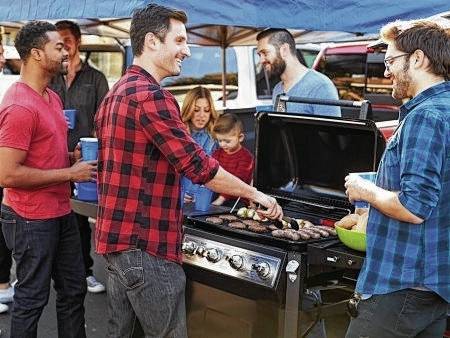
Question: I’ve finally got tickets to the game this weekend, and we’re planning a huge tailgate. Are there any food safety precautions I should take before, during and after the game?
Answer: One of the great things about fall and football season is tailgating. But just like picnicking on the beach or in a park, there are precautions you can take to ensure that your tailgate is a fun gathering for all that doesn’t result in a bout of foodborne illness for any of your guests.
First things first – it’s important that you keep the food you plan to serve at the tailgate at a safe temperature between home (if you’re making your food there), the store or restaurant (if you’re buying prepared foods), and the tailgate location, advises the U.S. Department of Agriculture’s Food and Safety Inspection Service.
This is because leaving food out of temperature control for more than an hour or two isn’t a good idea because bacteria grow rapidly at room temperature when food reaches the temperature “danger zone” — between 40 and 140 degrees Fahrenheit.
The primary issue, says Abby Snyder, an assistant professor and food safety field specialist in the College of Food, Agricultural, and Environmental Sciences (CFAES) at The Ohio State University, is that people tend to put out food during an event like a tailgate, and leave it out of temperature control for too long.
“That can lead to toxin secretion by bacteria as they grow in food,” she said. “And re-heating, which may kill the bacteria, is not always sufficient to inactivate the toxin. It leads to rapid onset of symptoms, sometimes fast enough that people can get sick before they even leave the tailgate.”
Annually, some 48 million people get foodborne illnesses, leading to 128,000 hospitalizations and 3,000 deaths each year, according to estimates from the Centers for Disease Control and Prevention.
USDA tailgating tips
Pack perishable foods like salads and dips in an insulated cooler packed with ice or frozen gel packs to keep it cold (below 40 degrees Fahrenheit).
When packing your cooler for the tailgate, be sure to wrap any raw meat and poultry securely to prevent their juices from cross-contaminating ready-to-eat food.
To keep food like soup, chili and stew hot (above 140 degrees Fahrenheit), use an insulated container. Fill the container with boiling water, let it stand for a few minutes, empty and then put in the hot food. Slow cookers and other warming devices that can be plugged into a car power outlet can also be used.
If you plan to grill food on site at your tailgate, make sure you use a food thermometer so you can ensure the meat and poultry reach a high enough internal temperature to destroy harmful bacteria that may be present. Hamburgers and bratwurst should be cooked to at least 160 degrees and chicken breasts to 165 degrees.
If you plan to bring hot takeout food, be sure to eat it within one hour of purchase.
Don’t forget to bring disposable cloths or moist towelettes and paper towels to clean your hands and other surfaces if a sink is not available.
If you have any perishable foods left from the tailgate, make sure you throw them out before going in to watch the game unless you are able to keep them stored in your cooler at 40 degrees or below the entire time. But if you are unsure if the food has been properly chilled at the correct temperature the entire time, it’s best to throw it out.
By the way, I hope your team wins … unless it’s playing against mine!


